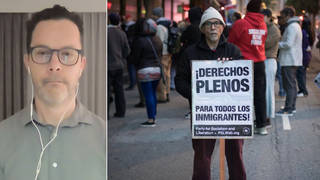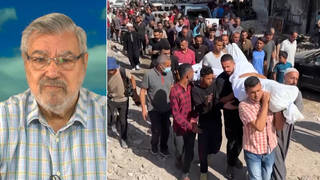
Topics
Guests
- Adrienne Pineprofessor of anthropology at American University in Washington, D.C.. Before and after the 2009 coup in Honduras, she collaborated with numerous organizations and individuals to bring international attention to the Honduran struggle to stop state violence and human rights abuses. She is the author of the book Working Hard, Drinking Hard: On Violence and Survival in Honduras.
Links
- "Zelaya's Return: Neither Reconciliation nor Democracy in Honduras" By Adrienne Pine (May 28, 2011, NACLA)
- "Working Hard, Drinking Hard: On Violence and Survival in Honduras." By Adrienne Pine (University of California Press, 2008)
- Democracy Now!’s Coverage of the Coup Against Manuel Zelaya and His Return to Honduras
Manuel Zelaya’s return has raised hopes of a Honduran reconciliation and a readmission to the Organization of American States. But Adrienne Pine, an American University professor who has worked extensively in Honduras, says the country is no closer to reconciliation than it was in the months following the June 2009 coup. “In order for there to be reconciliation, there needs to be justice,” Pine says. “The ongoing state violence needs to end.” [includes rush transcript]
Transcript
AMY GOODMAN: As we continue our special on the return of Manuel Zelaya, the ousted president of Honduras, we turn to Adrienne Pine, a professor of anthropology at American University.
AMY GOODMAN: You’ve just written a piece, “Zelaya’s Return: Neither Reconciliation nor Democracy in Honduras.” Explain the significance of the return and what is not happening here.
ADRIENNE PINE: Well, I think — the reason I wrote the piece was really in response to a lot of spin that’s been coming out of Washington in the past few weeks arguing that Zelaya’s return means a return to normalcy, democracy, and means reconciliation for Hondurans. And here in Honduras, speaking to lots of sectors of the resistance movement, it’s clear that nobody sees this as a reconciliation, in the sense that there’s a reconciliation between the people and the people who carried out the coup. But rather what this is is something that people have longed for: the return of Mel Zelaya. But that’s all that it is.
In order for there to be reconciliation, there needs to be justice. That’s what the people in the resistance movement are arguing. The impunity for the people who carried out the coup, the impunity for human rights violations, the impunity for crimes against humanity carried out during the period of the coup, and the ongoing violence, the ongoing state violence, needs to end. And so, I’m arguing that these arguments coming out of the State Department, from Hillary Clinton herself, and from a whole bunch of sort of latter-day Honduras experts are really flawed and even dangerous. They lead towards the argument that Honduras should be reintegrated into the OAS. There’s this sort of commonsense assumption that this will help Honduras. But within the resistance movement in Honduras, people are saying, “We don’t even recognize the government of Pepe Lobo. The last thing we want is for the Organization of American States to recognize it,” because that weakens the stance of those who are trying to bring attention to the horrible human rights violations.
AMY GOODMAN: Why don’t you talk about this? In the United States, we hear hardly anything about what’s happening in Honduras. What are the conditions on the ground?
ADRIENNE PINE: The conditions on the ground are atrocious, truly atrocious. In the past few months, the levels of state violence — that is, military and police violence — against people exercising their right — it’s also a right here in Honduras to protest — have been equal to those just following the coup. Teachers have been on strike, have been protesting the full-scale privatization of education, which is one of the main agendas of the Lobo administration. And in March, there were massive protests throughout the country. Police and military — and the police are also militarized, so they’re sort of conflated institutions in many ways — responded to these protests by firing live bullets and tear gas canisters directly at the protesters. One of the protesters who was killed was Ilse Velásquez, who was a teacher herself, but also the founder of COFADEH, one of the most important human rights organizations in Honduras. She was killed by a tear gas canister shot into her head, made in the United States, provided by United States aid to the military and police here. And the response we’ve gotten from the State Department for these horrific crimes against teachers protesting against the removal of public education from the country has been almost mockery. It’s just been horrible, blaming the teachers for getting themselves killed, for example.
AMY GOODMAN: Explain exactly who said what.
ADRIENNE PINE: Jeremy D. Spector, who is the attaché for labor and human rights issues here in the Tegucigalpa embassy, the U.S. embassy in Tegucigalpa, in a letter, blamed the protesters, called them “thugs,” said that the embassy had already spoken to the police, and human rights issues were taken care of vis-à-vis police, but what they were really worried about was these violent — and he used the word “thugs,” who were provoking disorder and violence. And he blamed — actually blamed the resistance movement on Ilse Velásquez — for Ilse Velásquez’s death, because she was run over by a vehicle in the chaos of the tear gas after she had been shot in the head by the state forces, the state security forces. It was clear that the tear gas canister shot in her head is what really killed her, but he used the fact that she was also run over by a car following that to blame the resistance for this, which obviously wouldn’t have happened if there weren’t tear gas being shot and people trying to escape it in the first place. So, that’s the kind of responses we’ve seen from the State Department and also from the Honduran government.
So, just this week, students at a high school in Tegucigalpa were protesting the fact that their math teacher was not — they had no math teacher, because their math teacher was one of the hundreds of teachers who was suspended by the Lobo administration for protesting, for nonviolently protesting the privatization of education. So, these students were protesting this fact. And in response, police came, invaded the school, which is illegal in Honduras, shot live bullets and tear gas canisters at the students, sent one of them to the hospital, arrested 21 of them and two of the mothers of students, who came to beg the police that they not — that they not continue. And, you know, this is the state of human rights right now, after the Cartagena Accords were signed.
AMY GOODMAN: It’s interesting that President Lobo himself visited New Orleans to look at their school system since Hurricane Katrina, you know, after they fired all the teachers and set up a whole new system of charter schools.
ADRIENNE PINE: In fact, there’s no coincidence at all there. A statement was issued by Lobo’s office saying that they were very happy to meet with the charter school administrators in New Orleans, because one of their main problems was the teachers’ union here in Honduras, and this was a way to deal with that problem. So, it’s a direct attempt not just to remove the possibility of education for vast numbers of Honduran poor children, but also to destroy one of the strongest unions that had been a pillar of the resistance movement and of democracy in Honduras.
AMY GOODMAN: Adrienne Pine, can you talk about the anti-terrorist law?
ADRIENNE PINE: The anti-terrorist law is a law promoted by Oscar Álvarez, who’s the minister of security under Pepe Lobo. He was also a previous minister of security. And he’s also the nephew of Gustavo Álvarez Martínez, who was the head of the death squad, Battalion 316, in the 1980s. So there’s a long trajectory there.
AMY GOODMAN: And that death squad battalion, just succinctly, for people who are not familiar with it?
ADRIENNE PINE: Battalion 316 was a CIA-trained death squad that disappeared and tortured and killed over 200 people in the 1980s during the Reagan era. This was done with the knowledge of John D. Negroponte, who at the time was ambassador to Honduras, and he in fact excluded, excised the specific mention of this from the human rights reports coming out from the U.S. government, State Department human rights reports. So, a very sordid history that the United States government is deeply involved in.
AMY GOODMAN: This was at a time when the U.S. was using Honduras, under Negroponte’s ambassadorship, as a launching ground for the Contras in the war in Nicaragua.
ADRIENNE PINE: That’s correct. Honduras was sort of seen as the U.S. base. It was even referred to as “U.S.S. Honduras” by expats, U.S. expats here in Honduras. And it was being used not only to launch operations against Nicaragua, but also against El Salvador. And, you know, that’s really the history of Honduras, is that it has been the U.S. military base in the region.
And we’re seeing that dramatically increase since the coup took place. We have two new bases in Honduras in areas that, perhaps not coincidentally, there have recently been oil found in one, the other is supposedly drug war-based. They’re both supposedly — the justification is they’re dealing with the drug war. But what we’ve seen with U.S. bases is that they haven’t at all decreased the flow of drugs in other countries, in Colombia and Mexico, but rather have led to greater violence.
There’s one other very important issue to note, which is that, legally, under the Honduran constitution, the U.S. military presence is temporary. And even though that’s a fiction, because they’ve been here for many years, many decades, there has always been an effort to maintain this façade by creating temporary structures. And just a few weeks ago, we discovered that the U.S. was offering a contract, a presolicitation, for contractors to build permanent barracks in Soto Cano Air Force Base, which is the most important air force base here in Honduras for the United States. And those barracks would be at a cost of up to $25 million to the U.S. taxpayer and will cover 7,000 square meters of Honduran territory.
AMY GOODMAN: This is also interesting because just before President Zelaya was forced out, he was talking about taking over Palmerola military base that is used by the United States.
ADRIENNE PINE: It is a very important hypocrisy to point out on the part of the American — of the U.S. government, because one of the key defenses that Hugo Llorens, the ambassador here in Tegucigalpa, has used to argue that the United States was not involved in the military coup in 2009 was that when the plane carrying Zelaya out of the country landed in Soto Cano, it wasn’t really landing in a U.S. Air Force base, because Soto Cano is actually Honduran territory and Honduran-controlled. We know that’s a lie. But because of their language around it being temporary, they were able to not have those accusations stick. Well, now it’s permanent. Now they’re building concrete structures, and they won’t be able to maintain that fiction any longer.
AMY GOODMAN: Back to the anti-terrorist law.
ADRIENNE PINE: So, back to the anti-terrorist law, basically what the anti-terrorist law does, it builds upon the anti-gang law, which was actually written in 2003 by Pepe Lobo when he was president of Congress, which defined identities as criminal. So, it criminalized belonging to a gang, but it also criminalized things that were identified with belonging to gangs, like tattoos and hanging out with people in gangs. And that was a period when gangs were seen as the biggest menace in Honduras.
Now, to the state, the biggest menace in Honduras is the resistance movement, which is far more political than gangs were seen as being. And so, what the anti-terrorist law does is redefine “terrorist” as being somebody — basically somebody who opposes the state. And so, it’s paving the way to criminalize dissent, to criminalize resistance, to criminalize the right to freedom of speech and freedom of assembly in Honduras. And it’s very worrisome. It also builds upon an anti-terrorist law that existed in the 1980s that was basically the same thing.
AMY GOODMAN: Can you talk about the various petitions that are being signed on a number of different issues here?
ADRIENNE PINE: Sure. There’s a really important “dear colleague” letter that is coming out in a few days from the Congress, and that letter asks Hillary Clinton to stop sending military aid to Honduras until there’s some sort of accounting for the vast human rights violations that are ongoing in this country. We’ve never seen such a large number of Congress people sign one of these letters, so that’s a huge success and puts enormous pressure on Clinton at a time when she’s really doing everything she can to whitewash human rights violations in the interest of getting Honduras reintegrated into the OAS.
AMY GOODMAN: And that letter was sent to Hillary Clinton this week. That was Adrienne Pine, professor at American University, speaking to us in Honduras. Special thanks to Hany Massoud, Andrés Conteris.












Media Options